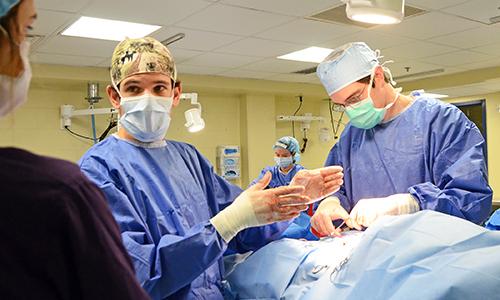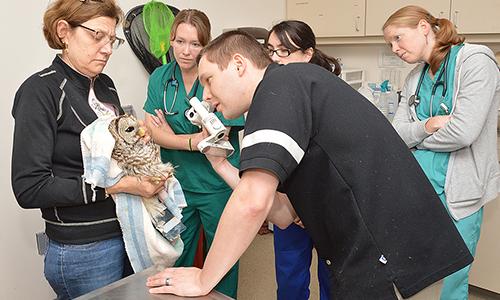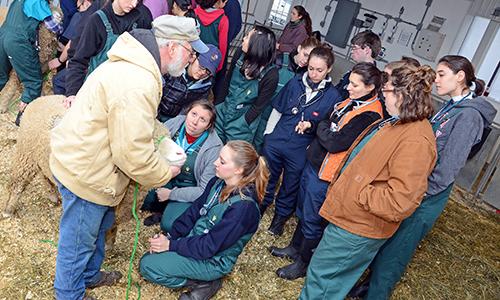-
About
- Leadership & Faculty
- News & Events
-
Academics
- Graduate
- Advanced Clinical Training
- Continuing Education
-
Student Life
- Graduate Programs
-
Research
-
Hospitals & Clinics
- Emergency Care
-
Community Outreach
- Volunteer
DVM Program
Apply Now
Get started or continue with your online application. For more information on Admissions Criteria, please visit the DVM Admissions page.
Veterinarians are uniquely qualified to address several important current and future issues that face our nation and the world. Their expertise is the consequence of an educational background that is strongly based on the principles of comparative biology and medicine as applied to a variety of animal and human health-related problems.
Purpose and Goals
The purpose of the Cummings School DVM program is to prepare graduates for entry level practice in any of the major domestic species, provide exposure to the innovative Cummings School Signature Opportunities, and provide enough flexibility and access to resources to allow our students to pursue non-practice or non-traditional practice careers (such as public health, wildlife, international veterinary medicine and biomedical research). The curriculum is designed to nurture students who will become leaders in developing the science, technology, and ethics that will shape the veterinary profession in the future and to foster students to become lifelong learners.
The goals of our DVM program are:
- To provide students with a strong foundation in the basic sciences and ample opportunities to apply their knowledge.
- To provide excellent medical and surgical training in order to graduate veterinarians who are competent and confident in their chosen field.
- To encourage critical thinking, research, evidence-based decision making, and lifelong learning.
- To offer students primary care learning opportunities to better prepare veterinary graduates for entry-level practice and provision of affordable care.
- To nurture interest in animal welfare, ethics, and public policy, One Health, international veterinary medicine, and wildlife.
- To enhance student competencies in non-technical skills such as communications, financial literacy, business management, emotional intelligence, and resilience.
- To help students to gain a broad understanding of diversity and cultural competencies.
Since the early days of the school, Tufts pioneered non-terminal use of animals in DVM education and remains a leader in this area. Read more about Animal Use in the DVM Program.
Programs and Opportunities

Dual Degrees
Dual degree programs are open to DVM students who wish to focus their training in research, public health, or laboratory animal medicine beyond the basic training in these areas in the DVM program.

Signature Opportunities
Cummings School of Veterinary Medicine has differentiated itself from other veterinary schools and colleges by developing special signature opportunities, programs with depth and relevance to the future of veterinary medicine.

Unique Opportunities
We offer a unique opportunity for students to design their DVM thus setting it apart from other veterinary schools. Cummings School offers special programs with sophistication and applicability to the future of the veterinary profession.
Explore our virtual tour and discover our campus
Campus Life

When our students have time to take a break from their studies, they enjoy life on campus. Spread across 594-acres, there are various places to relax in nature: a working farm, soccer field, dog park, bocce ball, volleyball and basketball courts, and picnic areas.
What makes Worcester a Great Place?
Central Massachusetts has a lot to offer. Location. Convenience. Variety. Find out what’s to love about Worcester.
Career Opportunities
Career opportunities for veterinarians abound and go well beyond the companion animal health care provider that comes initially to mind. Veterinarians provide medical care for companion animals, food- and fiber-producing animals, horses, exotic animals, captive aquatic animals, wildlife species and laboratory research animals. In addition to primary clinical care, veterinarians engage in biomedical research and pathology and participate in protection of the public health both in the United States and abroad. It is truly a diverse profession.
Contact
For additional information or questions about the DVM program, please contact the Office of Admissions:
Office of Admissions
Cummings School of Veterinary Medicine at Tufts University
200 Westboro Road
North Grafton, MA 01536
Phone: (508) 839-7920
Fax: (508) 887-4820
vetadmissions@tufts.edu